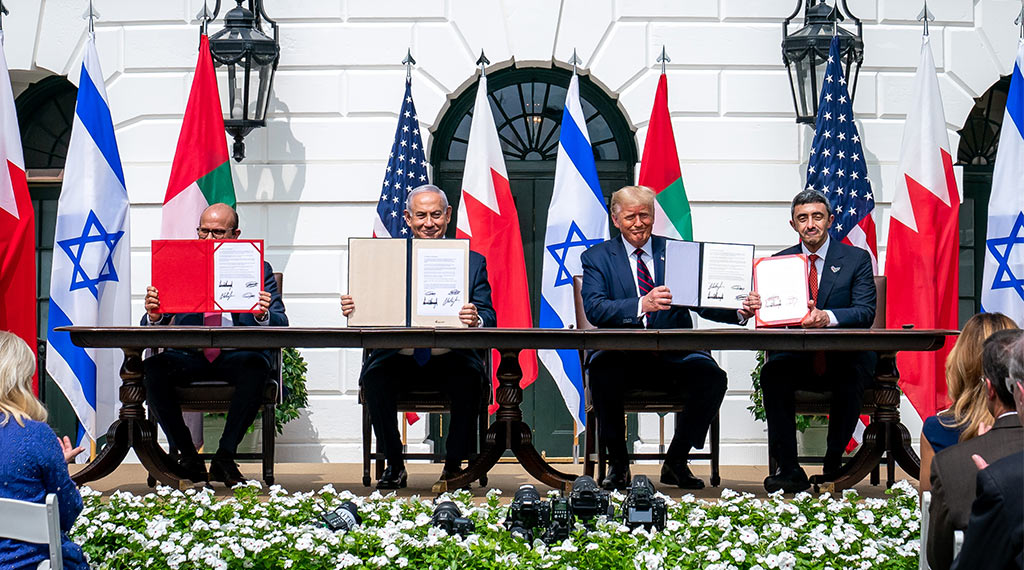Pro-Palestinian resistance targets Abraham Accord countries
Since the recent conflict erupted between the state of Israel and the Palestinians, Arab and Muslim governments have expressed their support to the Palestinian people, calling on both sides to deescalate the tension to prevent the loss of innocent victims from both sides.
Since then, the countries that chose peace in the Middle East and decided to normalize their relations with Israel by signing the Abraham Accords Peace Agreement have been under a heavy attack by several regional players including the Palestinians themselves.
The United Arab Emirates, Bahrain, Sudan, and Morocco have signed peace treaties with the Israel in 2020 during the presidency of former President Donald J. Trump.
Palestinian Minister of Foreign Affairs Riyad al-Maliki criticized these four countries for normalizing their relations with the state of Israel, according to Al-Jazeera report following Maliki’s attendance at an extraordinary meeting of the Organization of Islamic Cooperation on Sunday.
Maliki did not hesitate to insult the very same countries have supported the Palestinian people for decades by saying, “The normalization and the rush towards the racist, colonial Israeli regime without achieving peace and ending the occupation of the Arab and Palestinian lands, means supporting the apartheid and participating in the Israeli crimes.”
During the same conference Turkish TV TRT-Arabic reported that Turkey’s Foreign Minister Mevlut Cavusoglu emphasized that the two-state solution had become impossible to achieve in light of Israeli practices in Jerusalem and the Gaza Strip. Cavusoglu urged Muslim countries to unite for the sake of the Palestinians. “We have seen the decline in international support for Israel due to its racist policies. Who will take us seriously when Muslim countries normalize their relations with Israel?” he added.
From Turkey to Iran where the Islamic Republic has been publicly expressing its anti-Semitism views, former Palestinian Ambassador to the UN, Nasser al-Qudwa stressed in an interview with the Iranian TV al-Alam that the Gulf countries will realize that their relations with Israel will be solely based on one-sided economic and political control.
“The Israelis cannot be equal partners and historically, they have always been the only miserable beneficiaries,” al-Qudwa said, “We need to understand where is your national interest? We want to respect it. Meanwhile, we would like to see your position in support of principal cause,”
The Iranian narrative has been reflected in neighboring Iraq through the leaders of pro-Iranian militias that have served Tehran since 2003.
In a post on his Twitter account, Iraqi Shiite cleric and brutal militia leader Muqtada al-Sadr called on Abraham Accord countries to withdraw from the agreements and expel the Israeli ambassadors from their capitals.
Meanwhile, the Qatari pro-Hamas and Muslim Brotherhood Al-Jazeera reported that a group of Egyptian politicians and activists called on the same countries to confront the Israeli assaults in Gaza, Jerusalem, and other occupied Palestinian cities.
The group, in a statement published on Sunday, urged these countries “to reject racism and crimes against humanity” by expelling the Israeli ambassadors in their countries and to postpone all bilateral cooperation and state visits.
While the Kingdom of Saudi Arabia has not publicly expressed its intent to join the Abraham Accords club, it too got it share of hatred.
A video was widely circulated on social media platforms showed Vice President of the Islamic Movement Sheikh Kamal al-Khatib saying in an interview in December 2018 that the Saudi royal family is an occupying force in their country. Al-Khatib was recently arrested by Israeli security for alleged ties to Hamas and for inciting violence.
As the al-Aqsa mosque is being occupied and defiled by the Israeli government, the al-Masjid al-Ḥarām (The Forbidden Mosque) and The Prophetic Mosque are being occupied by Al Saoud therefore, I do not demand the end of the Israeli occupation of al-Aqsa mosque but the end of the Saudi occupation of the whole Hejaz region.
These types of rhetorical attacks indicate that any peace deal between Israel and the Palestinians is extremely unlikely in the near term and the gap between these four Abraham Accords countries which have chosen peace and prosperity, and a Palestinian leadership which has chosen corrupt government and terrorism, will continue to widen.
- Iran’s ambitions undermine peace in the Middle East - October 18, 2024
- Moderate Muslim voices deserve to be heard in America - July 25, 2023
- Specter of Afghanistan debacle haunts Biden - May 25, 2023

